 http://news.infoshop.org/ will be posting stories, accounts and updates here about the protests.
http://news.infoshop.org/ will be posting stories, accounts and updates here about the protests.
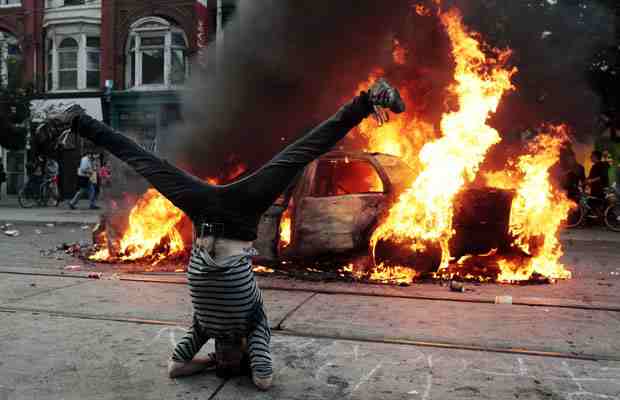
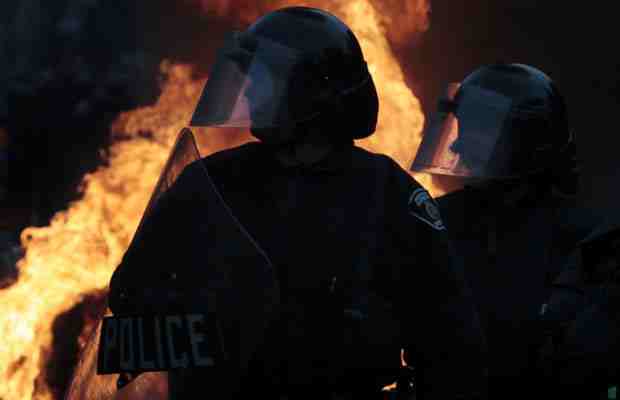
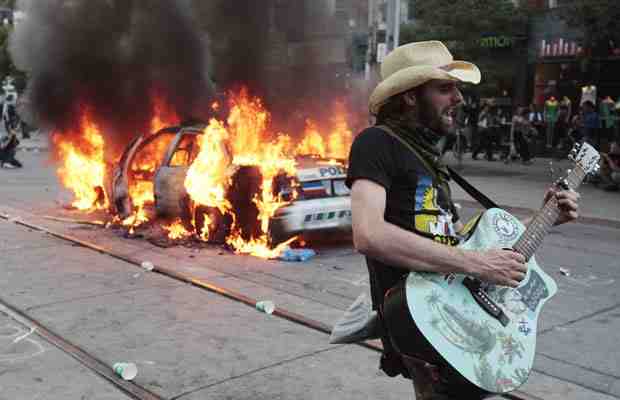
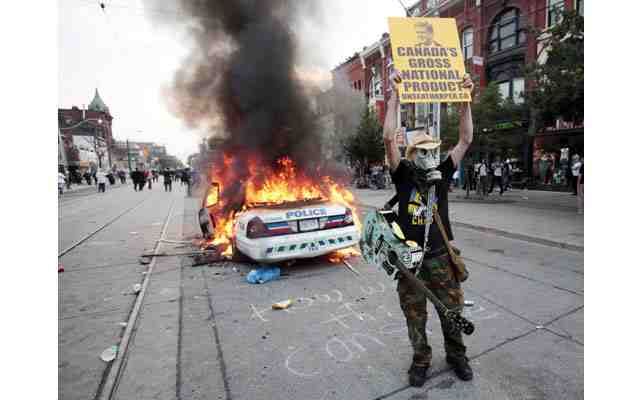
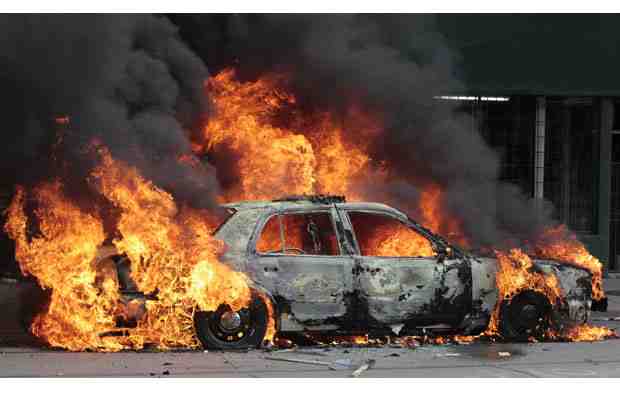
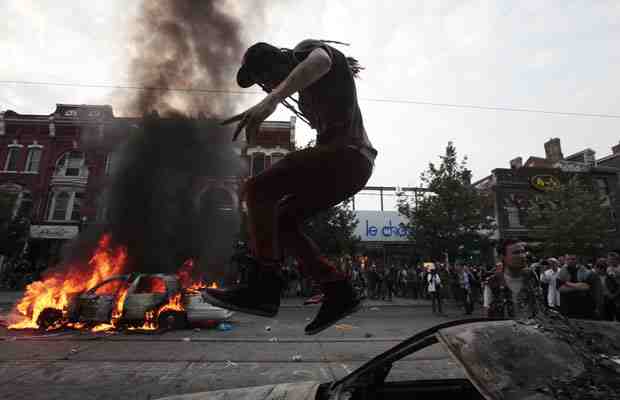
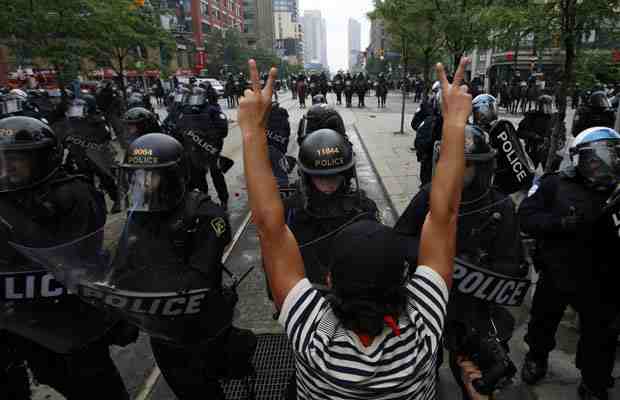
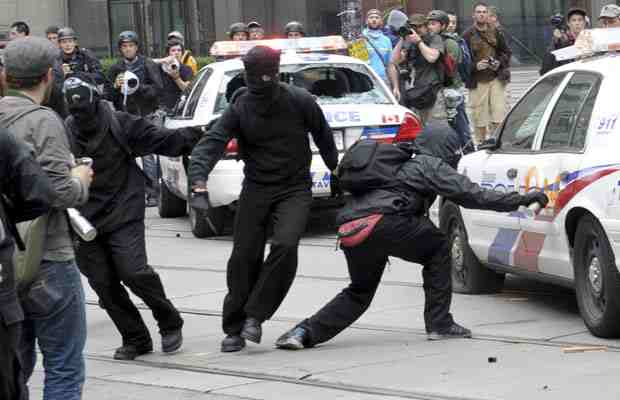
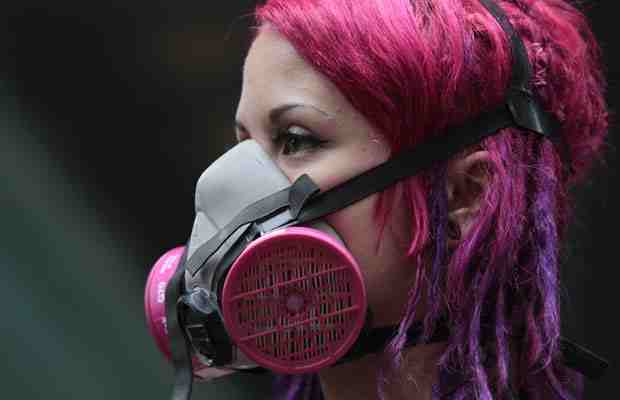
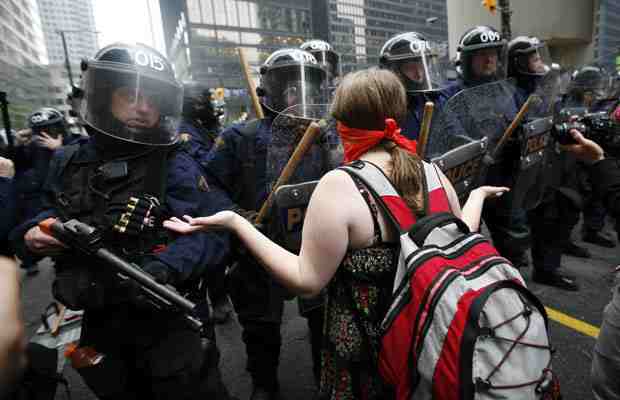
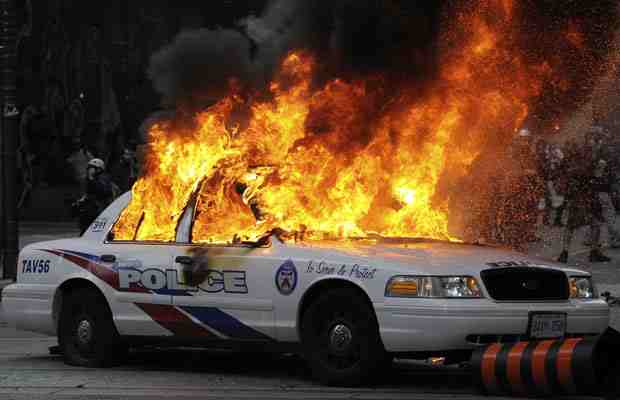
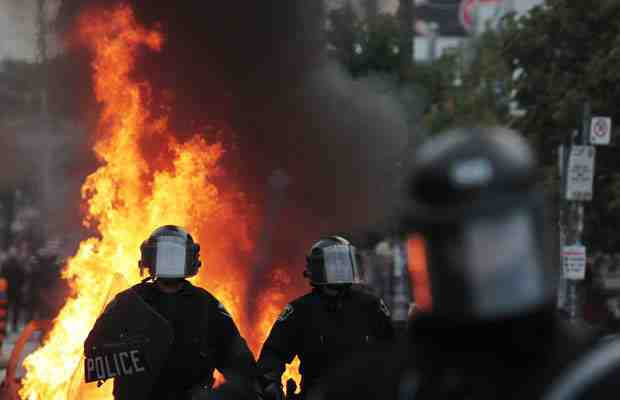
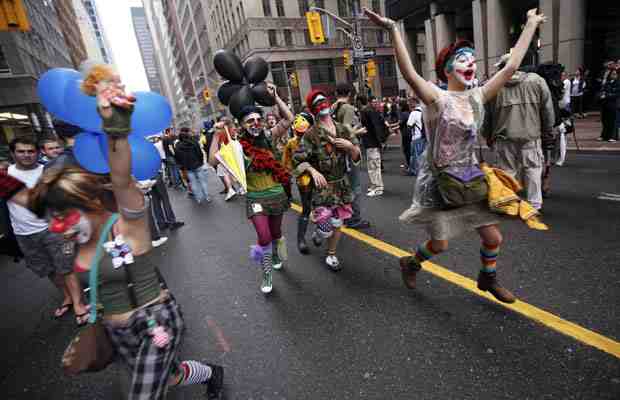
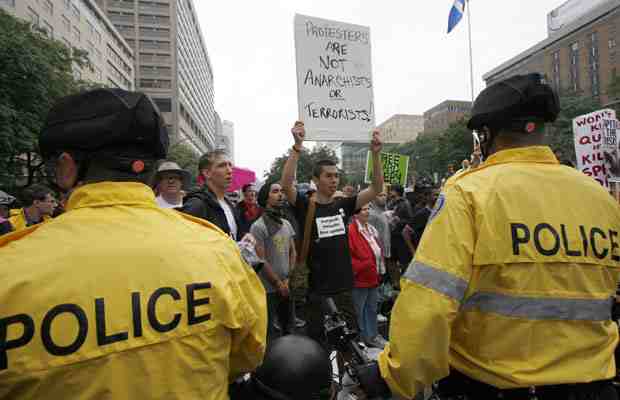
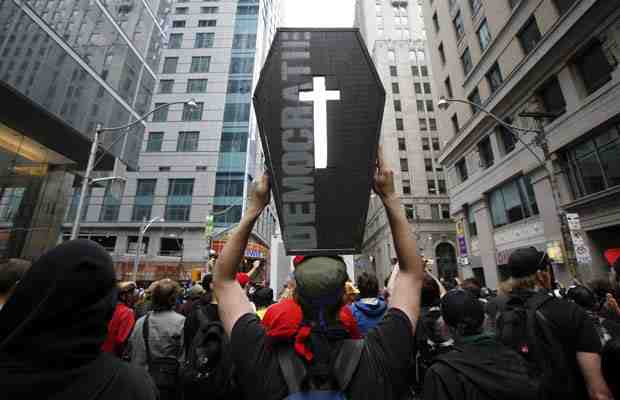
 http://wp.me/p5Xdy-WB
http://wp.me/p5Xdy-WB

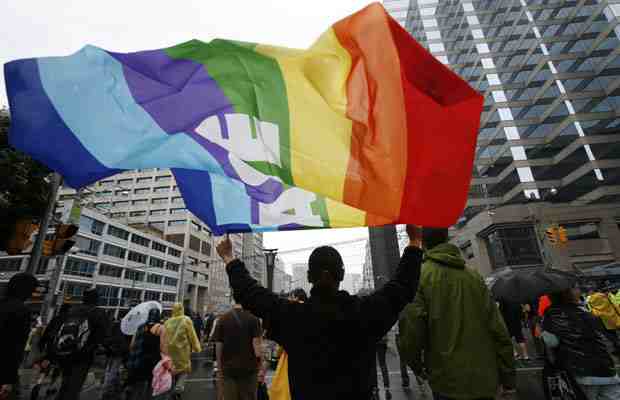
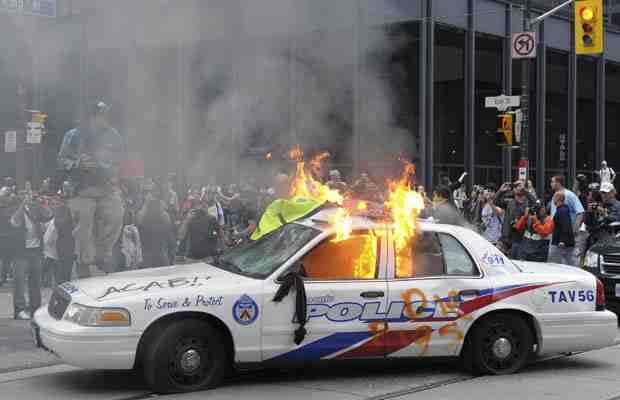
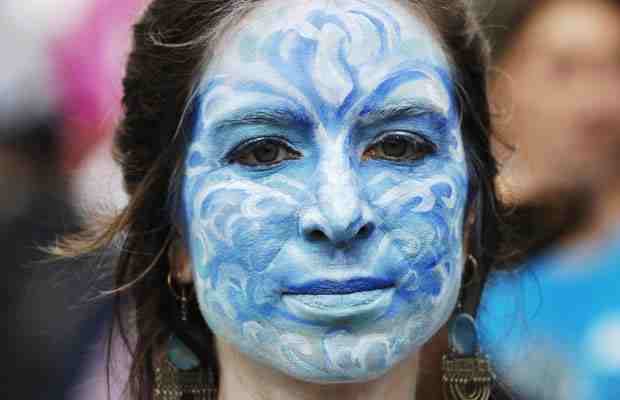
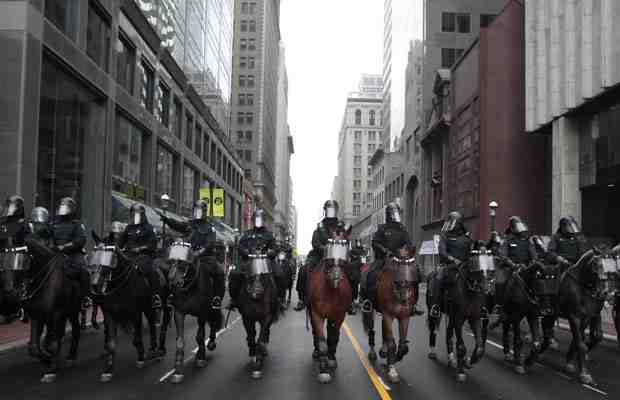
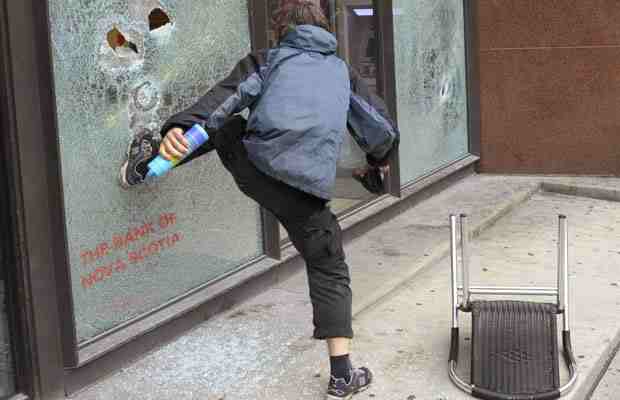
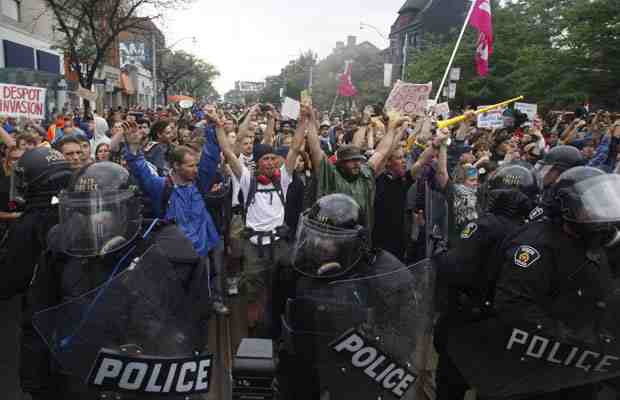
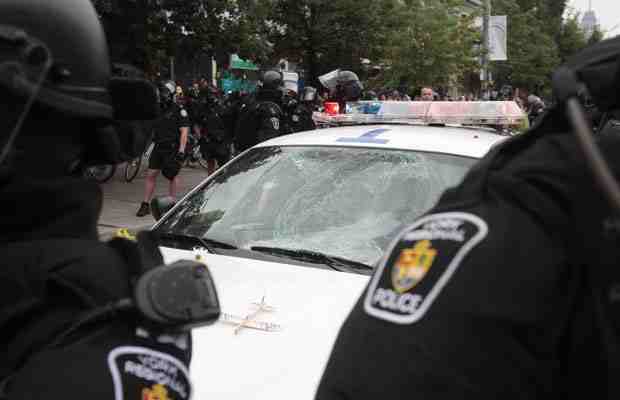
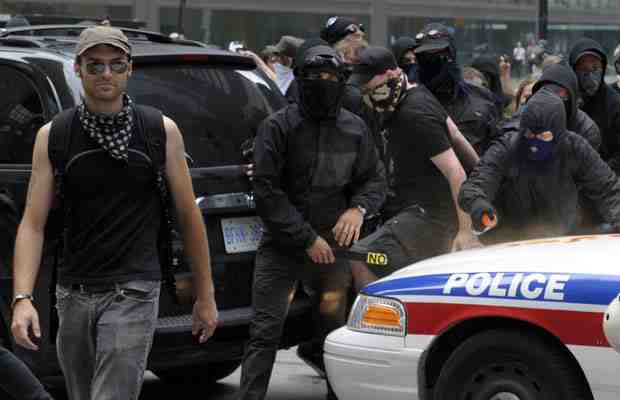
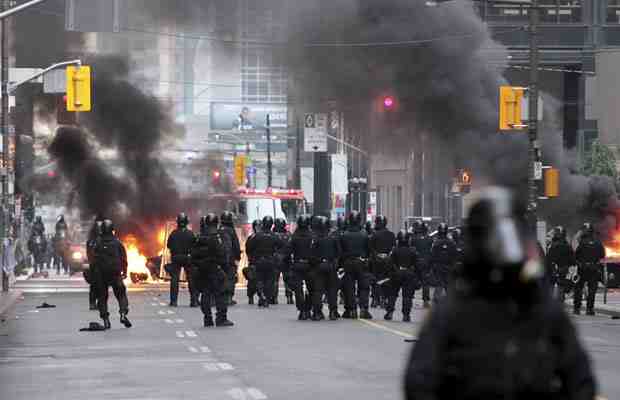
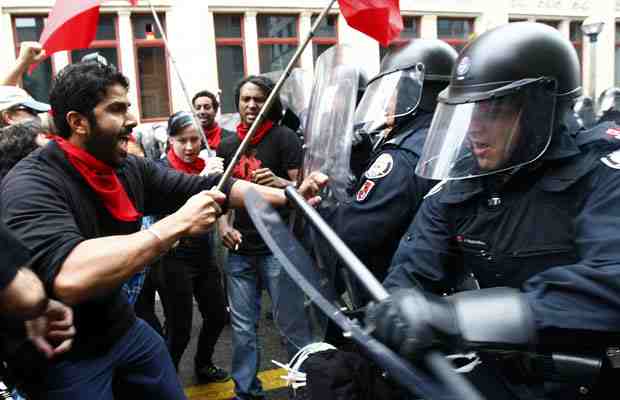
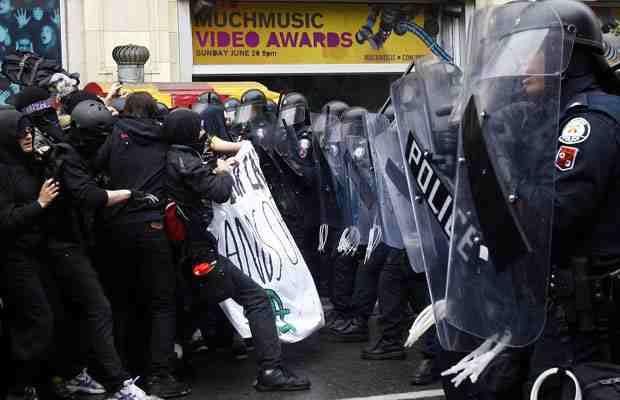
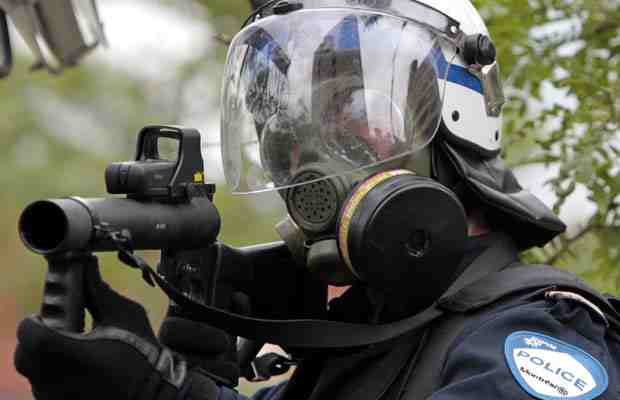
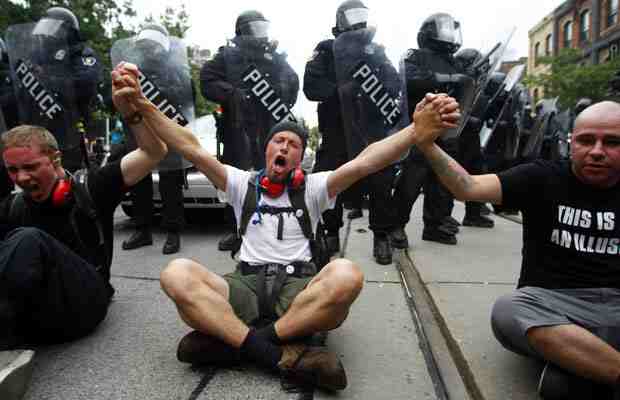
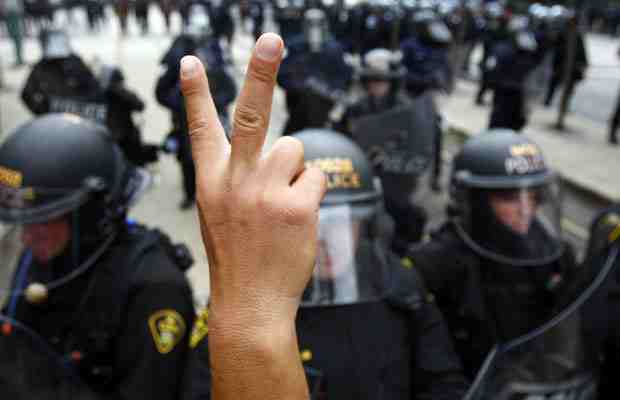

Comments
Hide the following 2 comments
Toronto police violently suppress G20 protests, arrest over 600
28.06.2010 07:43
Over the past 48 hours, as leaders of the G20 governments moved to coordinate a massive global austerity program directed at the international working class, police—for the first time in Toronto’s history—deployed snatch squads, tear gas and rubber and plastic bullets to disperse groups of peaceful protestors attempting to march to the fenced in perimeter of the G20 venue.
By Sunday evening, over 600 people had been arrested, many in the so-called “free speech zone,” and detained in a make-shift holding pen on the grounds of a local film studio. Reports emerged of beatings and other violent actions against peaceful demonstrators.
Prime Minister Stephen Harper’s government has spent $1.2 billion to date for the security of the summit. The decision to hold the event in the heart of Canada’s largest city, not to mention the outrageous expenses incurred, has been roundly criticized by broad layers of the Canadian population faced with ever deeper cuts to their wages, pensions and social services.
In the week before the arrival of the G20 leaders, downtown Toronto exhibited all the hallmarks of a city under a state of siege. Six kilometres of fencing, topped with concertina wire and anchored in concrete encircled the “red zone”—the actual meeting area. Police checkpoints fanned out another kilometre from the convention location. Snipers were stationed on the city’s high rise rooftops. American Navy Seals patrolled the harbour.
Citizens in the vicinity were instructed to carry picture identification and expect curb-side interrogation. Canine units waited in the side-streets. Phalanxes of federal, provincial and municipal police stood at every corner buttressed by more mobile bicycle and horse patrols. Even truck drivers have been approached to act as “look-outs” for the police.
In addition, a thousand private security guards were deployed throughout the city’s adjacent financial and entertainment districts. Seventy-seven new closed circuit surveillance cameras monitored all movement on the streets. Water and sound cannon were moved into place. Police helicopters hovered constantly overhead. Security Service operatives swept through the hotels, and Canadian Armed Forces soldiers stood “on the ready” at “undisclosed locations”.
Despite the fact that several peaceful protests had proceeded through downtown streets over the past week, police raiding parties on Friday night made several “preventative arrests”, entering a house without showing a warrant to drag away demonstrators asleep on the floor.
On Saturday afternoon, about ten thousand demonstrators marched from Queens Park—the grounds of the provincial legislature and the police designated “free speech zone”—in a “People First” protest organized by the Canadian Labour Congress and the Ontario Federation of Labour.
In heavy rain, the march proceeded to within four blocks of a massive fenced perimeter that has sealed off Toronto’s Convention Center area for the past week. The march, however, was stopped on Queen Street by hundreds of heavily armed police. Whilst thousands of marchers, after being confined and “kettled” by the police on the narrow street, returned to the “free speech zone,” about two thousand stayed in place and insisted on their right to march.
During the stand-off, about 75 people—purported members of anarchist groups—broke away from the demonstrators and proceeded to spray paint graffiti and smash several dozen shop windows and bank branch ATM’s.
A police car was vandalized and set alight. A reporter noted that the gas cap for the car had been removed prior to the “Black Bloc’s” arrival. Shortly thereafter, at the corner of Bay and King—the centre of Canada’s financial district another police car was set ablaze.
It was at this time that local television stations, followed by CTV and the CBC—the country’s national news network—broke away from regular programming to breathlessly broadcast for hours on end “live” saturation coverage of events in the streets of the city. Video of the burning patrol car was then looped and re-looped into the country’s living rooms throughout the afternoon and into the night.
As always, police provocation may well have played a role in isolated acts of vandalism. The patrol car, torched by three or four individuals, was done in full view of a whole phalanx of riot policemen who stood idly by at the intersection. “Backup! Put your batons down”, shouted the attending police captain to the riot squad. No attempt was made to arrest the perpetrators. Fire extinguishers possessed by the police were not deployed. The Toronto Fire Department, which can respond to any downtown emergency within minutes, did not arrive for over an hour as camera teams gathered from all the networks.
As the small group of anarchists proceeded onto Yonge Street, Toronto’s main shopping district, to smash more windows, reporters noted that despite the mobilization of thousands of police officers, not one could be seen on the city’s busiest thoroughfare.
Shortly thereafter, the office of Prime Minister Stephen Harper—the man who has shut down parliament twice in the space of two years to circumvent opposition to his government—issued a statement. “Free speech is a principle of our democracy, but thugs that prompted violence earlier today represent in no way, shape or form the Canadian way of life”.
The incident spurred Police Chief Bill Blair to appear before the news media in the early evening to denounce violent demonstrators and to assure the population that the Integrated Security Force would bring the full force of the law down on the protest.
Throughout the rest of the night and into Sunday, police rampaged through the ranks of the various peaceful demonstrations marching in the downtown core. In the “free speech zone” protestors staging a sit-in were arrested en masse. Young people were clubbed and kicked. A CTV producer, Farzad Fatholahzad, covering the protest was arrested. En route to the detention centre on the prisoner’s bus, he reported that detainees were bruised and bleeding. One man, suffering from concussion, was slipping in and out of consciousness. All were denied medical attention. At the University of Toronto, seventy youth sleeping on a college lawn were assaulted and arrested.
At a Novotel hotel, that had been struck earlier in the week by members of the Hotel and Restaurant Employees union, a small group of protestors gathered in solidarity after midnight. Riot police violently broke up the peaceful demonstration.
Steve Paiken, a lead journalist for public television broadcaster TV Ontario, tweeted the following on-the-spot report: “(The Police) repeated they would arrest me if I didn’t leave. As I was escorted away… I saw two officers hold a journalist. The journalist identified himself as working for the Guardian. He talked too much and pissed the police off. Two officers held him. A third punched him in the stomach. Totally unnecessary. The man collapsed and the third officer drove his elbow into the man’s back. The demonstration on the Esplanade was peaceful. It was like an old sit-in. No one was aggressive and yet the riot squad moved in.”
On Sunday morning, police used tear gas and more plastic bullet to disperse friends of detainees who had gathered at the detention centre to greet released comrades. More violent arrests were made, including of legal advisers. Scores of detainees were released without any charge having been laid. They reported abysmal conditions in the cells. Most were denied water, toiletries and food for up to fourteen hours. A police officer referred to the previous night’s dragnet as a “catch and release” program.
Police and the government seized on the acts of vandalism to justify this brutal crackdown. The police released a statement Saturday night declaring, “We have never tried to curtail people’s rights to lawfully protest. All you have to do is turn on the TV and see what’s happening now. Police cars are getting torched, buildings are being vandalized, people are getting beat up (sic) and the so-called ‘intimidating’ police presence is essential to restoring order. That is the reality on the ground”.
Arrests and demonstrations in Toronto continue.
The World Socialist Web Site carries no brief for those groups of anarchists who, by engaging in vandalism, arm the agents of the state with the propaganda to intensify their attacks on the democratic rights. Their actions play directly into the hands of the very forces they claim to oppose. As observers of other international summits are well aware, the police do not hesitate to infiltrate agents-provaceteurs into their ranks in order to create the sort of mayhem that allows for the unleashing of police terror against the general population.
It would not be the first time such tactics were used to create the conditions for further curtailment of democratic rights. In 2007, at a North American leaders’ conference in Montebello, Quebec, police dressed as demonstrators were filmed carrying rocks and agitating amongst the crowd to join them in violent acts. And in 2001 at the Genoa, Italy, G8 conference, police agents were discovered to have instigated violence during protests.
The media plays its role through all-night saturation coverage, preempting virtually all network programming, highlighting the vandalous actions of some seventy-five people. In comparison, when a hundred thousand people demonstrated in Toronto against the American invasion of Iraq in 2003, the largest social movement of Canadians in the country’s history, it rated a minute long sound-bite on the nation’s networks.
Paul Franklin
 Homepage:
http://wsws.org/articles/2010/jun2010/poli-j28.shtml
Homepage:
http://wsws.org/articles/2010/jun2010/poli-j28.shtml
The mass repression at the G20 summit in Toronto
30.06.2010 18:54
The police operation was used to violently repress an overwhelmingly peaceful protest by thousands of people opposed to the policies of the governments represented at the summit. Even prior to the demonstration, police preemptively arrested alleged leaders of the protest. The massive state operation was a brazen assault on basic free speech and assembly rights.
A spree of window-breaking Saturday by so-called “Black Bloc” anarchists, which bore the hallmark of a state-organized provocation, became the pretext for mass arrests and beatings. Over the ensuing 36 hours, reports the Canadian Civil Liberties Association (CCLA), “over 900 people (possibly close to 1,000) were arrested by police—the largest mass arrest in Canadian history. Media, human rights monitors, protestors and passersby were scooped up off the streets. Detained people were not allowed to speak to a lawyer or to their families. Arbitrary searches occurred in countless locations across the city, in many instances several kilometers from the G20 summit site. Peaceful protests were violently dispersed and force was used. In an effort to locate and disable 100-150 vandals, the police disregarded the constitutional rights of thousands.”
The CCLA report understates the level of repression. According to diverse accounts, the police—outfitted in riot gear and wearing gas masks—acted in an extremely provocative and brutal manner, beating marchers and bystanders alike, firing rubber bullets, charging into peaceful crowds, trapping protesters and making them wait for hours in the pouring rain, depriving detainees of food and medication, and generally trampling on the most elementary rights with sadistic glee. The cops were given a green light to do as they pleased against the population.
This was the culmination of a lengthy process. According to the CBC, “CSIS [Canadian Security Intelligence Service] has spent the last 12 to 18 months gathering intelligence it hopes could help the RCMP [Royal Canadian Mounted Police] with ‘any breaches of the law that might occur’” at the G20 gathering.
In a deeply antidemocratic move, the provincial cabinet passed a new regulation June 2 under the Ontario Public Works Protection Act of 1939 allowing the police to require individuals approaching the “security zone” around the G20 meeting to show identification and to subject them to searches, under penalty of arrest.
The authorities harassed and intimidated protest groups and individuals “in the lead-up to and during the summit,” according to the Toronto Media Co-op. The web site notes that “four community organizers arrested and charged with conspiracy were picked up hours before yesterday’s ‘violent’ demonstrations even began. One of the organizers was detained on her way to give a press conference to denounce the raids on the houses [of other protest organizers].”
The attacks on democratic rights prior to the G20 and the massive police action last weekend had little to do with locating and disabling “100-150 vandals,” among whom there were no doubt a considerable number of police provocateurs—any more than the US war in Afghanistan is about capturing or eliminating 50-100 Al Qaeda members.
The security operation in Toronto (and Huntsville, Ontario for the preceding G8 Summit), which cost the Canadian government in the area of $1.2 billion, was aimed at further criminalizing political protest, intimidating opposition and creating the conditions for even greater repression.
It had the character of a dress rehearsal for even bigger operations. The state violence outside the G20 meeting was closely linked to the policy discussions going on inside the Metro Toronto Convention Centre, which centered on plans to make working people around the world pay for the capitalist economic crisis.
Every head of state present, most of them despised by their own citizens, knows that the measures to be taken against the living standards of hundreds of millions of people worldwide will provoke anger and opposition, as the Greek events have demonstrated. The austerity policies cannot be implemented peacefully and democratically. They must ultimately be imposed by force.
The transformation of downtown Toronto into an armed camp, for the purpose of protecting the cabal of bourgeois politicians, joined by the managing director and chairman of the International Monetary Fund and the president of the World Bank, is expressive of the real state of social relations on a global scale. Ranged on one side—the bankers, the corporate elite and their political flunkeys; on the other—broad layers of the population, as yet politically unclarified but determined to fight for decent conditions for themselves and their families.
The ruling elite has the advantage at this point of a higher degree of consciousness about its crisis and the steps it needs to take. The right-wing minority Conservative government of Stephen Harper in Canada, along with the Ontario provincial Liberal government of Dalton McGuinty and the local Toronto authorities, took pains to organize a major confrontation with protesters, which they hoped they could use to their political advantage.
The holding of the event in the middle of Toronto was itself something of a provocation. The city has been a center of anti-globalization sentiment and a mass showing of opposition could be counted on.
A columnist from the Vancouver Sun, perhaps hinting at more than she meant to, referred wonderingly to “a Conservative decision last fall to hold the G20 in a congested place like downtown Toronto,” and mused, “It is hard to understand why Ottawa knowingly would have agreed to provide a venue for the mischief-makers.” A good question, which hardly permits an innocent answer.
The violence itself was largely stage-managed. With thousands of police on hand, none could be found to do anything to protect stores and banks in the downtown area. A column in the Ottawa Citizen, written by an eyewitness, noted that despite the $1 billion spent on security, “on Canada’s longest street [Yonge Street], at Canada’s busiest intersection, in the middle of the afternoon, the police were nowhere to be seen as members of the so-called Black Bloc darted in and out of crowds, just long enough to take pick-axes to store-front windows. Where were the police then?”
The claims by police, who had infiltrated and carried out surveillance against organizers of the G20 protest for a year-and-a-half, that they were taken aback by the violence are too crude and transparent to be taken seriously. One should have no doubt that the police knew the anarchists’ plans better than the anarchists, even helping to draw them up.
The burning of police cars, which had been conveniently left in the path of the “Black Bloc” forces (one of them reportedly with its gas cap removed), was another dubious event, primarily intended for the national news programs. The Harper government hopes that the sight of anarchists “rampaging” through the streets of Toronto will inflame the more naïve and backward sections of the Canadian population and beef up support for its law-and-order, anti-working class policies.
The events in Toronto are a serious warning. The level of official violence is being ratcheted up. In the face of the upheavals to come, the state in every country is working up plans for mass repression.
What dominates the politics and social relations of every country is the global economic crisis, which has reached an advanced stage. All the emphasis must now be placed on the development of a consciously socialist and internationalist movement of the working class, the only progressive response to the police state provocations and violence of the ruling elites.
David Walsh
 Homepage:
http://wsws.org/articles/2010/jun2010/pers-j30.shtml
Homepage:
http://wsws.org/articles/2010/jun2010/pers-j30.shtml